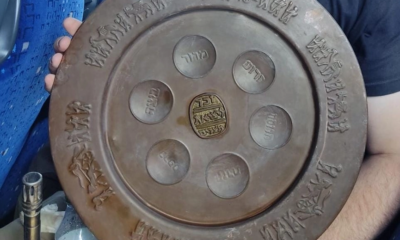
Israel

‘We’re ready for anything’, says firefighter on Gaza border
A volunteer firefighter who was born in South Africa has been at the forefront of the fight to protect Israel’s “Gaza envelope” – the area of Israel that shares a 40km border with the Palestinian enclave.
Former farmer Keith Isaacson, who is head of security in the Eshkol region, says his family made aliyah to the area in 1975 and has never left – and he will stop at nothing to protect it.
Last week, a video went viral of Isaacson standing in front of a fire which he said was on a moshav nearly 7.5km from the border with Gaza as a result of a rocket landing there. For him, it was just another day at the office, as he attempted to help wherever he could as the area faced a barrage of destruction from the sky.
Of the 4 000 rockets fired into Israel over the past two weeks, “just more than 1 200 were fired into the Eshkol region, and of that, 72 were fired directly into kibbutzim and moshavim. If 30% of missiles are shot into one area, it definitely has side effects,” he says.
These include rockets that have burned acres of agricultural land in Israel, and residents leaving the area to get a break from the incessant stress. “We don’t call it evacuation,” says Isaacson. This is home for him and so many others, and they certainly aren’t leaving.
Though people in the area are resilient, Isaacson says, more than 50% have had to have counselling to deal with the trauma of living under a rain of rockets. “I’m sure there will many more. The whole world comes to this area of Israel to learn about how we treat trauma because there is no one more experienced.”
One of his most challenging moments in recent days was “saving wooden houses from a big fire. It surrounded us, but we managed to fight it.” Though the farm’s fields were burned, he’s satisfied that they managed to save the homes from going up in flames.
“My father is from Johannesburg, my mother from Namibia. We made aliyah in 1975, straight to a moshav next to Gaza,” Isaacson says. A husband and the father of two sets of twins, he was a farmer until 2014, when Operation Protective Edge wreaked havoc on the region.
“After that, I decided to close my farm and go into security, hoping to restore the confidence that was damaged in 2014. I mostly work with the army because it’s such a sensitive area which shares borders with Gaza and Egypt. I also work with emergency units like fire fighters and rescue teams.”
Isaacson says that 40km – two thirds of the Eshkol region’s border – is shared with Gaza, and 20km with Egypt. “In those 20km, there are many problems with fighters from ISIS [the Islamic State of Iraq and the Levant] interacting with the Egyptian army, which affects us daily. It’s not our fight, but because it’s so close, we are affected. ISIS is trying to smuggle drugs, and it’s violent smuggling, with shooting. This whole area feels the bombardment of the Egyptian army. It’s not a quiet border.”
Yet, ultimately it’s a peaceful region, with wide-open spaces and the beauty of farming communities. When he was a farmer, Isaacson’s main crop was chrysanthemums. “It’s the biggest farming area in Israel – about 450 000 square metres of agricultural land,” he says. “It’s mainly tomatoes, but also vegetables and citrus.”
Terrorists across the border know that the fields are susceptible to fire and take advantage of it. “They send fire balloons and kites which are always carried inland as the wind flows in from the sea. They don’t care about nature and conservation. But for us, to see the fields burn is traumatic. Since 2019, they have burnt 40 000 square metres. But lately it has been much less as we have better equipment and are much more organised. There is much more co-operation between fire fighters and nature reserves.”
The area is also affected by terrorist tunnels, snipers, drones, and anti-tank missiles from Gaza. Another danger from the recent rocket attacks is missiles left on the ground, some of which haven’t yet exploded. “We have the demolition squad come in, and their work can take up to a month,” Isaacson says. But, in spite of the dangers, “I doubt one family will leave the area,” he says. His parents, brother, and three out of his four adult children live in the Eshkol region.
As Israel battled Hamas, Isaacson says, “We definitely hit them hard – especially their military capacity and tunnel network.” He points out that the Israeli army “works tirelessly to prevent the loss of innocent life, sending warnings for civilians to evacuate well ahead of operations”. In this context, most of those killed were terrorists, and the total loss of life in Gaza was low compared to what it could have been if any other army was at war in such a highly populated area.
As the ceasefire came into effect, Isaacson notes that “there are many different factions in the terrorist groups, so we hope that no factions break the ceasefire. We are ready for anything, and we are proud to be civilians of this area.”










